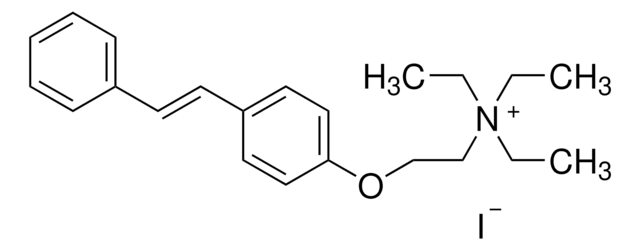M3148
2-Mercaptoethanol
for molecular biology, suitable for electrophoresis, suitable for cell culture, BioReagent, 99% (GC/titration)
Synonym(s):
β-Mercaptoethanol, 2-Hydroxyethylmercaptan, BME, Thioethylene glycol
About This Item
Recommended Products
grade
for molecular biology
Quality Level
vapor density
2.69 (vs air)
vapor pressure
1 mmHg ( 20 °C)
product line
BioReagent
assay
99% (GC/titration)
form
liquid
expl. lim.
18 %
reaction suitability
reagent type: reductant
concentration
14.3 M (pure liquid)
technique(s)
cell culture | mammalian: suitable
electrophoresis: suitable
refractive index
n20/D 1.500 (lit.)
pH
4.5-6 (20 °C, 500 g/L)
bp
157 °C (lit.)
solubility
H2O: soluble 1 mL/mL
density
1.114 g/mL at 25 °C (lit.)
foreign activity
DNase, RNase, protease, none detected
storage temp.
2-8°C
SMILES string
OCCS
InChI
1S/C2H6OS/c3-1-2-4/h3-4H,1-2H2
InChI key
DGVVWUTYPXICAM-UHFFFAOYSA-N
Looking for similar products? Visit Product Comparison Guide
Application
β-mercaptoethanol or 2-mercaptoethanol has been used:
- as a supplement in Roswell Park Memorial Institute (RPMI)-1640 medium to culture DT40 cells (chicken B cell line)
- to lyse NuLi-1 (Normal Lung, University of Iowa-1) cells
- to trypsinize mouse embryonic stem cells
signalword
Danger
Hazard Classifications
Acute Tox. 2 Dermal - Acute Tox. 3 Inhalation - Acute Tox. 3 Oral - Aquatic Acute 1 - Aquatic Chronic 2 - Eye Dam. 1 - Repr. 2 - Skin Irrit. 2 - Skin Sens. 1A - STOT RE 2 Oral
target_organs
Liver,Heart
Storage Class
6.1A - Combustible acute toxic Cat. 1 and 2 / very toxic hazardous materials
wgk_germany
WGK 3
flash_point_f
154.4 °F - closed cup
flash_point_c
68 °C - closed cup
ppe
Faceshields, Gloves, Goggles, type ABEK (EN14387) respirator filter
Choose from one of the most recent versions:
Already Own This Product?
Find documentation for the products that you have recently purchased in the Document Library.
Customers Also Viewed
Protocols
Perform colorimetric assays for nonradioactive quantification of cellular proliferation, viability, and cytotoxicity for adherent or suspension cells cultured in 96-well microplates.
This protocol describes a method for culturing TS cell lines. These cells can then be used to study trophoblast differentiation and placental function.
Our team of scientists has experience in all areas of research including Life Science, Material Science, Chemical Synthesis, Chromatography, Analytical and many others.
Contact Technical Service









